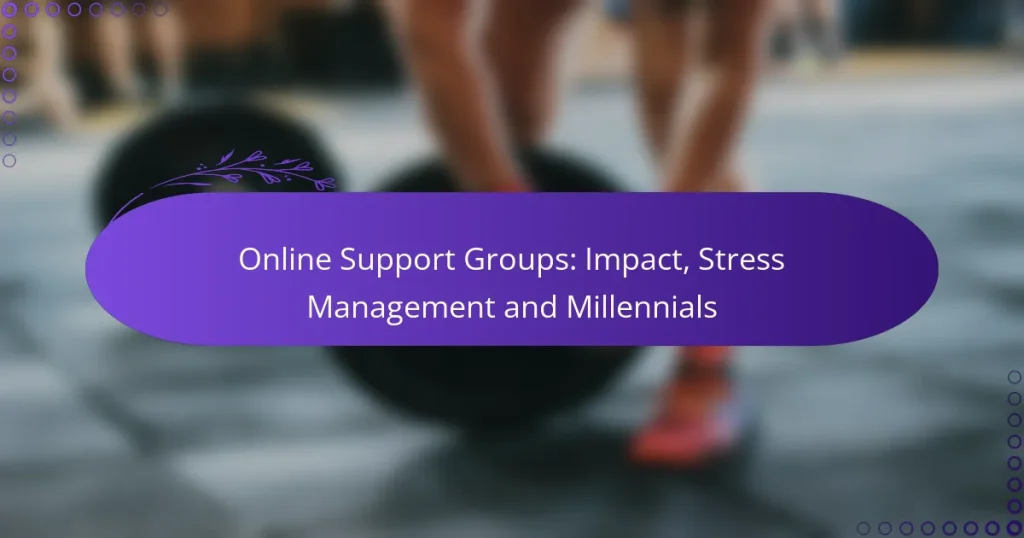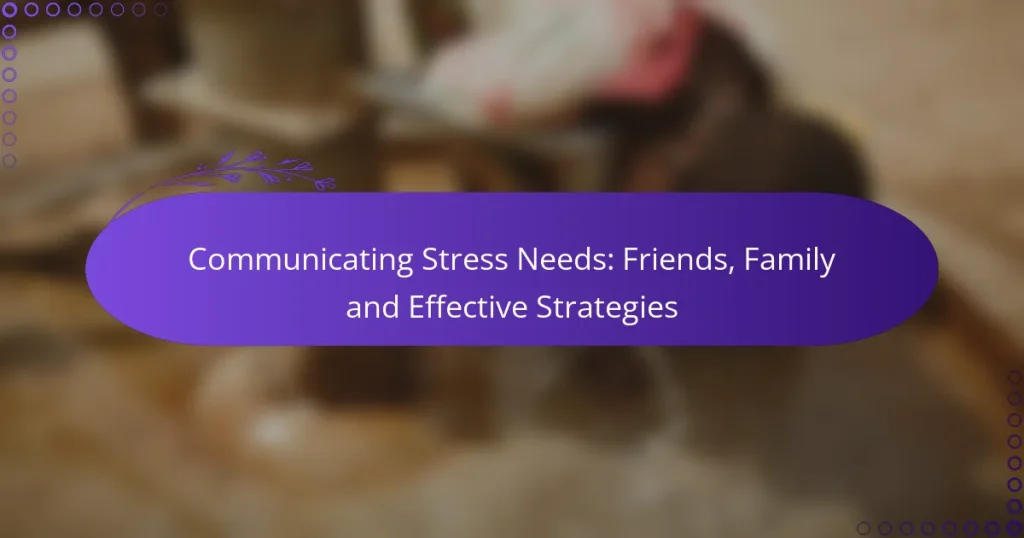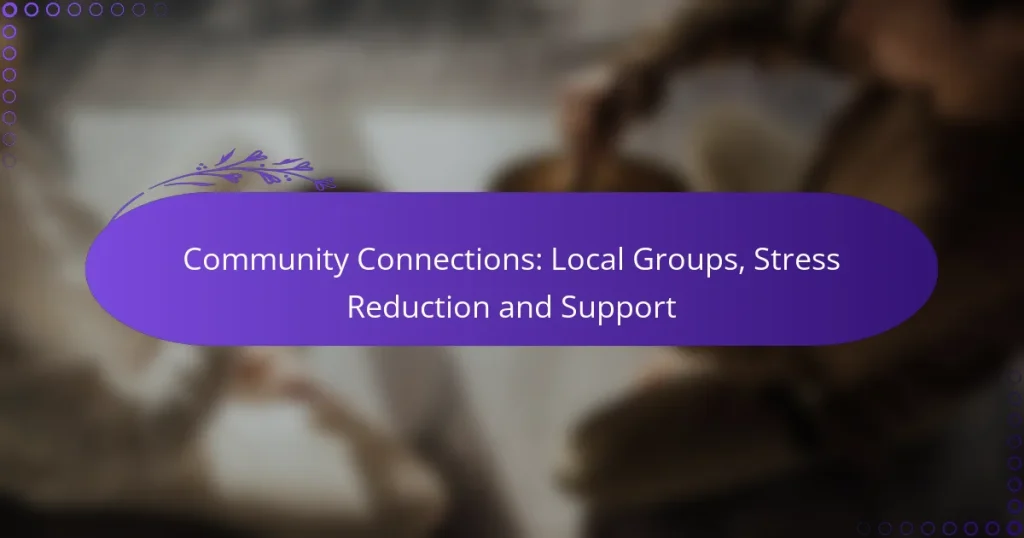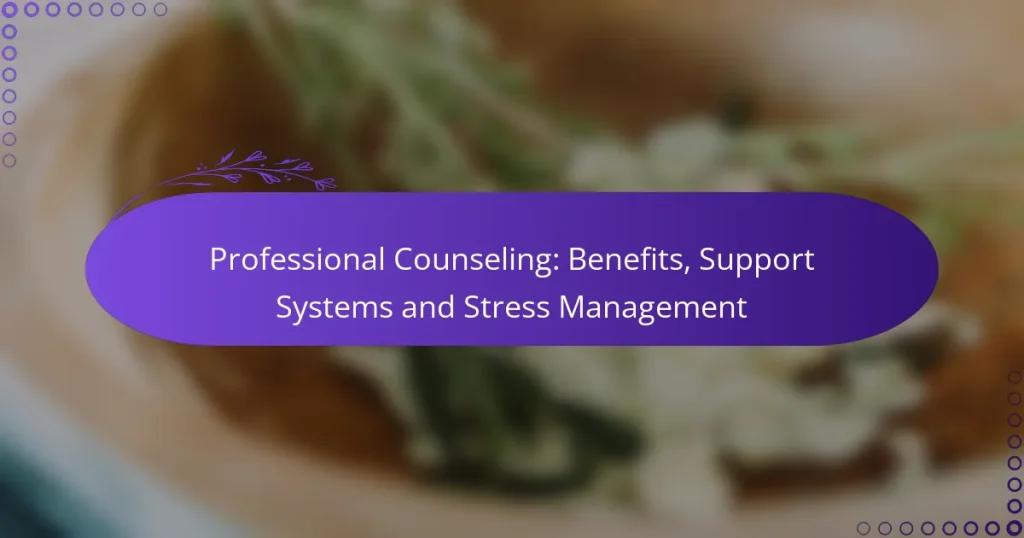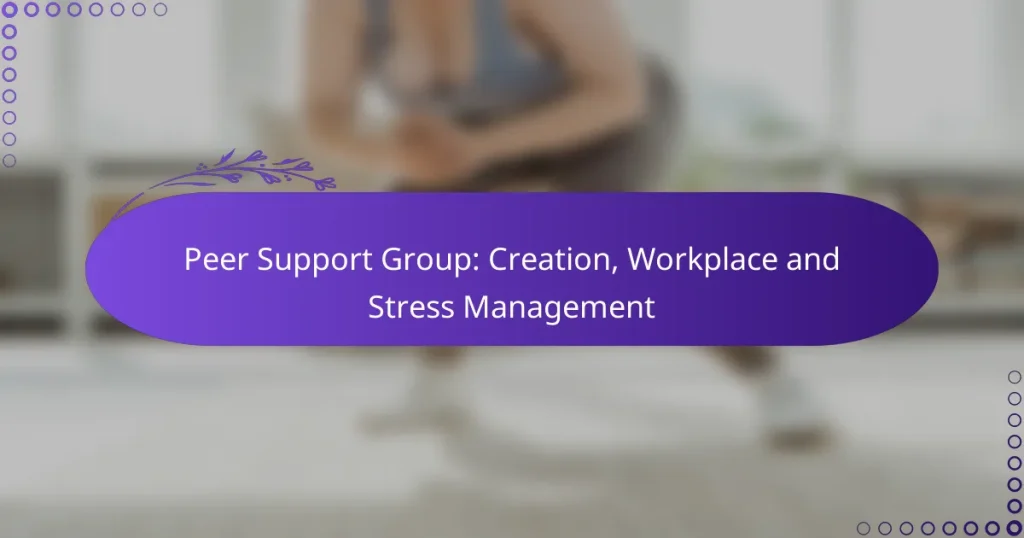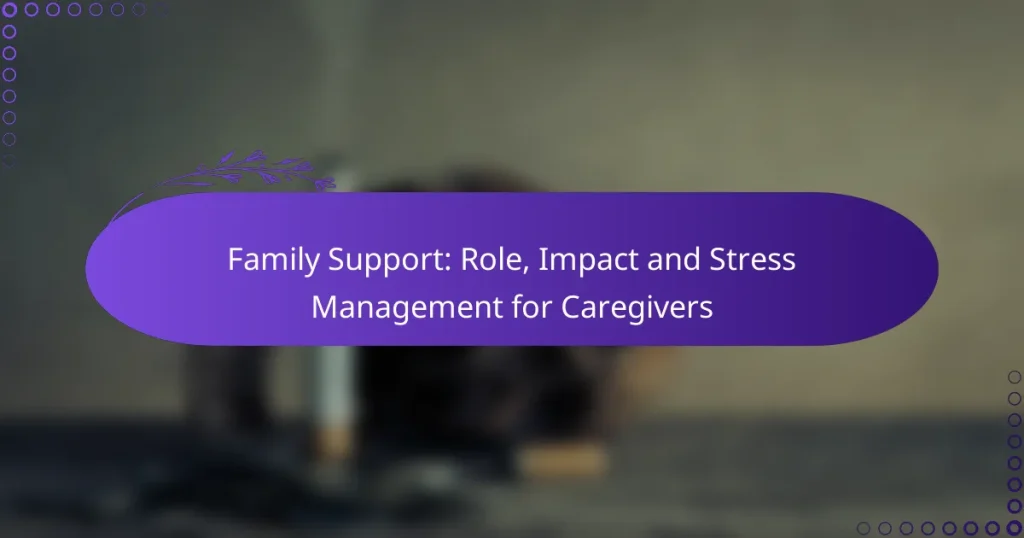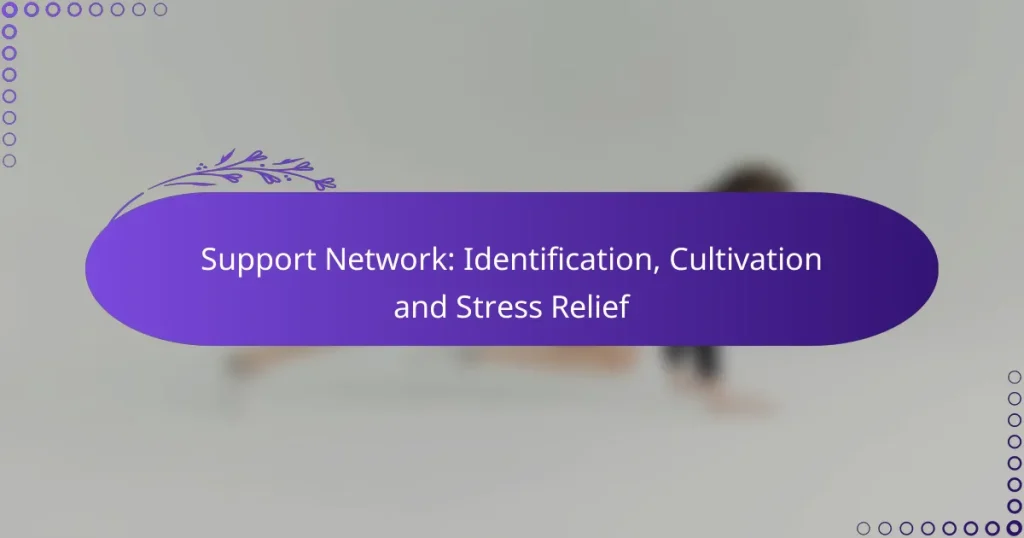Building effective support systems for stress management is essential for enhancing well-being and coping with life’s challenges. These systems encompass emotional support, practical strategies, and community connections, helping individuals navigate stress more effectively. By identifying supportive individuals and resources, one can create a network that fosters resilience and understanding during difficult times.
Communicating Stress Needs: Friends, Family and Effective Strategies
Community Connections: Local Groups, Stress Reduction and Support
Professional Counseling: Benefits, Support Systems and Stress Management
Peer Support Group: Creation, Workplace and Stress Management
Family Support: Role, Impact and Stress Management for Caregivers
Support Network: Identification, Cultivation and Stress Relief
What are effective support systems for stress management?
Effective support systems for stress management include various resources and services that help individuals cope with stress. These systems can provide emotional support, practical strategies, and community connections to enhance overall well-being.
Therapy and counseling services
Therapy and counseling services offer professional guidance to help individuals process stress and develop coping mechanisms. Options include individual therapy, group therapy, and family counseling, each tailored to specific needs. Consider seeking licensed therapists who specialize in stress management techniques.
Many insurance plans cover mental health services, making therapy more accessible. Look for local providers or online platforms that offer virtual sessions, which can be convenient and flexible.
Support groups and community programs
Support groups and community programs create a space for individuals to share experiences and strategies for managing stress. These groups can be found through local health organizations, community centers, or online platforms. They often focus on specific issues, such as anxiety, depression, or work-related stress.
Participating in a support group can foster a sense of belonging and reduce feelings of isolation. Many groups are free or low-cost, making them an affordable option for those seeking connection and support.
Mindfulness and meditation apps
Mindfulness and meditation apps provide accessible tools for stress reduction through guided practices. Popular apps like Headspace and Calm offer a variety of sessions that cater to different levels and preferences, from short breathing exercises to longer meditations.
These apps often include features such as progress tracking and reminders to help users establish a consistent practice. Many offer free trials or basic versions, making it easy to explore before committing to a subscription.
Workplace wellness initiatives
Workplace wellness initiatives aim to create a healthier work environment that supports stress management. These programs may include stress management workshops, fitness classes, or access to mental health resources. Employers often recognize the benefits of supporting employee well-being, leading to increased productivity and job satisfaction.
Employees should inquire about available wellness programs at their workplace and participate actively. Engaging in these initiatives can enhance personal resilience and contribute to a more supportive workplace culture.
How can I build a personal support system?
Building a personal support system involves identifying individuals and groups that can provide emotional, practical, and social support during stressful times. This system can include friends, family, community members, and online networks that foster connection and understanding.
Identify trusted friends and family
Start by making a list of friends and family members you feel comfortable reaching out to during stressful moments. Look for those who are good listeners and offer constructive advice without judgment. Aim to connect with at least three to five individuals who can provide consistent support.
Consider scheduling regular check-ins with these trusted individuals, whether through phone calls, texts, or in-person meetings. This proactive approach helps maintain strong relationships and ensures that you have a reliable support network when needed.
Engage in local community activities
Participating in local community activities can help you meet new people and expand your support system. Look for events such as workshops, volunteer opportunities, or social clubs that align with your interests. Engaging in these activities not only fosters connections but also provides a sense of belonging.
Consider joining groups that focus on stress management or mental wellness, as they often attract individuals with similar experiences. This shared understanding can enhance the support you receive and offer valuable coping strategies.
Utilize online support networks
Online support networks are a valuable resource for connecting with others who face similar challenges. Platforms such as forums, social media groups, and dedicated mental health websites can provide a sense of community and anonymity. Look for groups that focus on stress management or mental health to find relevant discussions and resources.
When participating in online networks, remember to engage respectfully and share your experiences while being open to others’ perspectives. This reciprocal support can create a positive environment that benefits all members involved.
What role do professionals play in stress management?
Professionals play a crucial role in stress management by providing guidance, support, and strategies tailored to individual needs. They help clients identify stressors, develop coping mechanisms, and implement effective stress reduction techniques.
Licensed therapists and psychologists
Licensed therapists and psychologists are trained to diagnose and treat mental health issues related to stress. They utilize various therapeutic approaches, such as cognitive-behavioral therapy (CBT) and mindfulness techniques, to help clients manage their stress effectively.
When seeking a therapist, consider their specialization and approach. For example, some may focus on trauma, while others emphasize anxiety or depression. It’s essential to find a professional whose methods resonate with you for optimal results.
Life coaches and wellness consultants
Life coaches and wellness consultants offer support in achieving personal goals and improving overall well-being, including stress management. They often focus on lifestyle changes, goal-setting, and accountability to help clients navigate stressors in their daily lives.
Unlike therapists, life coaches typically do not address mental health disorders but can be beneficial for those looking to enhance their coping strategies. When choosing a coach, look for certifications and testimonials to ensure they have the necessary skills and experience.
How do I choose the right support system?
Choosing the right support system for stress management involves identifying your personal needs and evaluating the resources available to you. A well-suited support system can significantly enhance your ability to cope with stress effectively.
Assess personal needs and preferences
Start by reflecting on what type of support you find most helpful. Some people prefer emotional support from friends and family, while others may benefit from professional guidance through therapy or counseling. Consider your comfort level with sharing personal experiences and the type of interaction you value.
Additionally, think about your lifestyle and schedule. If you have limited time, online support groups or apps might be more convenient than in-person meetings. Prioritize options that align with your preferences to ensure consistent engagement.
Evaluate available resources in my area
Research local resources that can provide the support you need. This may include mental health professionals, community centers, or support groups. Check online directories or local health services to find options that are accessible and relevant to your situation.
Consider the cost of these resources as well. Some services may be covered by insurance, while others might require out-of-pocket expenses. Look for free or low-cost options, such as community workshops or peer support groups, which can be effective without straining your budget.
What are the benefits of group support for stress management?
Group support for stress management offers emotional backing and practical strategies, enhancing individual coping mechanisms. Engaging with others facing similar challenges fosters a sense of belonging and reduces feelings of isolation.
Shared experiences and emotional validation
When individuals share their experiences in a group setting, it creates a powerful environment for emotional validation. Participants often find comfort in knowing that others have faced similar stressors, which can alleviate feelings of loneliness and self-doubt.
This shared understanding encourages open discussions about feelings and reactions, allowing members to express themselves without fear of judgment. Such validation can significantly enhance one’s emotional resilience and overall well-being.
Access to diverse coping strategies
Group support provides access to a variety of coping strategies that individuals may not have considered. Members can share techniques that have worked for them, ranging from mindfulness practices to time management tips, broadening the toolkit available for stress relief.
For example, one member might introduce breathing exercises, while another shares insights on setting boundaries at work. This exchange of ideas fosters creativity in problem-solving and encourages individuals to experiment with different approaches to manage their stress effectively.
What are common stress management techniques?
Common stress management techniques include practices that help reduce stress levels and improve overall well-being. These methods can be easily integrated into daily routines and often yield significant benefits for mental health.
Deep breathing exercises
Deep breathing exercises focus on controlling your breath to promote relaxation and reduce stress. Techniques such as diaphragmatic breathing or the 4-7-8 method can be effective in calming the mind and body.
To practice deep breathing, find a quiet space, inhale deeply through your nose for a count of four, hold for seven seconds, and exhale slowly through your mouth for a count of eight. Repeat this cycle several times to feel the calming effects.
Physical activity and exercise
Engaging in physical activity is a powerful way to manage stress. Exercise releases endorphins, which are natural mood lifters, and can help alleviate feelings of anxiety and tension.
Consider incorporating at least 30 minutes of moderate exercise, such as brisk walking or cycling, into your daily routine. Aim for a mix of aerobic activities and strength training to maximize benefits.
Time management strategies
Effective time management can significantly reduce stress by helping you prioritize tasks and avoid last-minute pressure. Techniques such as the Eisenhower Matrix or the Pomodoro Technique can help you stay organized and focused.
To implement these strategies, start by listing your tasks, categorizing them by urgency and importance, and setting specific time blocks for focused work. Regularly review and adjust your priorities to maintain a balanced workload.
How can technology enhance stress management?
Technology can significantly enhance stress management by providing tools and resources that promote mindfulness, organization, and emotional support. From mobile apps to online therapy platforms, these innovations offer accessible ways to track stress levels, practice relaxation techniques, and connect with professionals.
Mobile applications for stress relief
Mobile applications designed for stress relief can help users manage their mental health effectively. Popular apps often include features like guided meditations, breathing exercises, and mood tracking, allowing individuals to monitor their stress levels over time. For example, apps like Headspace and Calm provide structured programs that cater to various needs, making it easier to incorporate stress management into daily routines.
Online therapy and support groups
Online therapy platforms and support groups offer convenient access to mental health professionals and peer support. Services like BetterHelp and Talkspace connect users with licensed therapists through video calls, messaging, or phone sessions. This flexibility can reduce barriers to seeking help, making it easier for individuals to find the support they need when facing stress.
Wearable technology for stress monitoring
Wearable technology, such as smartwatches and fitness trackers, can monitor physiological indicators of stress, like heart rate and sleep patterns. By providing real-time feedback, these devices can help users identify stress triggers and develop healthier habits. For instance, a smartwatch that alerts users to elevated heart rates can prompt them to engage in calming activities, enhancing overall stress management.
Virtual reality for immersive relaxation
Virtual reality (VR) can create immersive environments that promote relaxation and mindfulness. VR applications often simulate calming settings, such as beaches or forests, allowing users to escape their daily stressors. This technology can be particularly beneficial for individuals who struggle with traditional relaxation techniques, offering a unique and engaging way to unwind.
